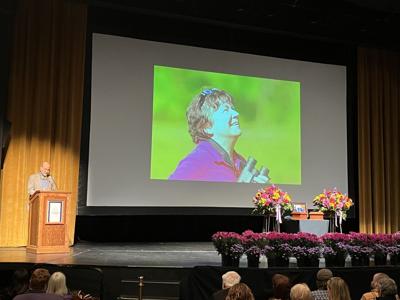CASTLETON — Friends, family and Castleton community members filled the rows of Vermont State University Castleton’s Casella Theater on Sunday afternoon to celebrate the life and legacy of Honoree Fleming.
Fleming, a 77-year-old Castleton resident and a former dean at what is now VTSU Castleton, was shot and killed on Oct. 5 while on a walk on the D&H Rail Trail.
She is survived by her husband, Ron Powers, and their son, Dean.
A friend of Fleming’s for nearly 20 years and a trusted former coworker, retired VTSU Castleton Academic Dean Joe Mark provided remarks during the ceremony, sharing how the murder of someone so caring and generous has shaken the community.
And though he added that Fleming did not care much for the limelight, he expressed the necessity of a memorial to remember and honor a beautiful soul.
“An event like this is important and necessary for our community. Not only does it recognize Honoree’s life and contributions, but it is also a celebration of the kind of work and commitment she cared about,” Mark said.
He expressed his admiration for her intelligence, humor, compassion and concern for others, but also for her no-nonsense attitude, scrupulous honesty and straightforward nature.
“She was a wonderful cook and hostess, too — particularly after the family visited the Amalfi Coast. In her menus, expertly and lovingly prepared, (she) often recreated the delicious fare of northern Italy. Of course, with both Honoree and Ron at the table, the quality of the conversation rivaled that of the food,” Mark said.
Sentiments were also shared by other close family friends during the ceremony, including Ronald Sherwin, the former Director of Choral Activities at Castleton State College; Lindsey Rogers-Seitz, a mentee of Ron’s; and Gayle Friedman, the director of a soon-to-be released documentary adaptation of Ron’s 2017 book, “No One Cares About Crazy People.”
Later in the ceremony, Dean took to the podium to share memories of his mother, adding that he believes she is in better condition today in heaven than she has ever been.
“She’s dining with some of the finest minds in science. She has hugged (my brother) Kevin and Grammy. She has laughed so hard at God’s wonderful sense of humor and the ongoing joke behind life,” he said. “Life may be tragic at times and death is an unpleasant reminder that life is not perfect. But heaven is.”
Though he said she died an agnostic, he expressed that his mother lived her life affecting more good than many who profess faith, but practice not.
“Mom may be the first agnostic saint,” he said.
Ron, the last to speak, began his remarks by addressing the crowd of what felt like “every friend we’ve ever had.”
“Honoree Fleming was the best human being I have ever met. Her name could have been chosen by the gods. Honoree consecrated in her life to walk in goodness. She was a happy woman and she made others happy. She made me happy on a scale I’d never known existed,” he said.
He went on to tell the story of how he and Fleming met — as two walk-ons seated next to one another by chance on a flight from LaGuardia Airport to Chicago O’Hare in spring 1976.
“I boarded first and took my aisle seat. And then I looked up and saw this luminous woman entered the plane and walk slowly down the aisle,” Ron said. “I said a little prayer. … ‘God, with the few good things I’ve done in my life, let her sit next to me.’ God was in a good mood. We were friends before we landed in Chicago. But I knew I wanted to marry her before she sat down.”
Ron also spoke on Fleming’s passion for encouraging women to pursue careers in science, adding that in a such male-dominated field, she extended a sisterly arm to students and helped to awaken countless young minds during her time at Trinity College and Middlebury College.
He recalled the summers the family spent in Middlebury, where Fleming took care of their children while Ron taught at the Middlebury Bread Loaf Writers’ Conference.
He recalled when Middlebury College denied her tenure and, in turn, how she found a home as a leader at Castleton.
He recalled the many early mornings she spent enveloped in her research on human endometrial cells and her work discovering a new energy producing cellular superstructure — the mitonucleon.
Through rejections and triumphs, he said, Fleming was “indomitable, almost.”
“We were as in love as on the day we met. Two walk-ons off to see the world,” he said. “The world finally got her. The world lurched out of the bushes along a (trail) that Honoree loved to walk and put a gun to her head,” he said. “It took small arms fire to bring Honoree down. The world has plenty of that and not enough Honorees. And now it has one less.”
sophia.buckley-clement
@rutlandherald.com


